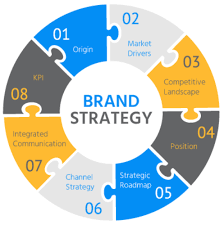Brand Strategy Consulting Firms: Unlocking the Power of Your Brand
In today’s competitive business landscape, building a strong and recognisable brand is essential for long-term success. However, developing an effective brand strategy requires expertise, insight, and a deep understanding of consumer behaviour. This is where brand strategy consulting firms come into play, offering invaluable guidance to businesses looking to unlock the power of their brand.
Brand strategy consulting firms are specialised agencies that help businesses define, develop, and implement strategies to enhance their brand identity and positioning. These firms bring together a team of seasoned professionals with extensive experience in branding, marketing, and consumer psychology. Their objective is to assist companies in creating a unique and compelling brand that resonates with their target audience.
One of the key benefits of engaging a brand strategy consulting firm is their ability to conduct comprehensive research and analysis. They delve into market trends, competitor strategies, and consumer insights to gain a thorough understanding of the industry landscape. Armed with this knowledge, they can identify opportunities for differentiation and craft a strategic roadmap tailored to the specific needs of each client.
Brand strategy consulting firms also play a crucial role in helping businesses define their brand purpose and values. They work closely with clients to articulate their vision, mission, and core beliefs – elements that form the foundation of a strong brand identity. By aligning these values with customer expectations and market trends, consulting firms help create an authentic brand narrative that resonates with consumers on an emotional level.
Furthermore, these firms assist in developing effective communication strategies that bring the brand story to life. They craft compelling messaging frameworks that convey the essence of the brand consistently across various touchpoints – from advertising campaigns to social media presence. This ensures that every interaction with customers reinforces the desired perception of the brand.
Another area where brand strategy consulting firms excel is in guiding businesses through rebranding or revitalisation processes. Whether it’s due to changes in business focus or evolving market dynamics, companies often need to adapt their brand to stay relevant. Consulting firms provide the expertise and guidance necessary to navigate these transitions successfully, ensuring that the brand remains cohesive and resonates with both existing and new customers.
Furthermore, brand strategy consulting firms offer ongoing support in monitoring and evaluating brand performance. They help businesses track key metrics and consumer sentiment, providing insights that inform future strategies. By continuously assessing the effectiveness of branding initiatives, these firms ensure that brands remain agile and adaptable in an ever-changing marketplace.
Overall, engaging a brand strategy consulting firm can be a game-changer for businesses aiming to build a strong and memorable brand. These firms bring a wealth of knowledge, experience, and fresh perspectives to the table. They help companies define their unique value proposition, create compelling brand narratives, and develop effective communication strategies – all of which contribute to increased customer loyalty, market share growth, and long-term success.
In conclusion, in today’s competitive business environment, partnering with a brand strategy consulting firm can give your business the edge it needs to thrive. With their expertise in research, analysis, strategic planning, and creative execution – these firms unlock the true potential of your brand by creating meaningful connections with your target audience. So why wait? Invest in your brand’s future today by leveraging the insights offered by a reputable brand strategy consulting firm.
8 Essential Tips for Choosing a Brand Strategy Consulting Firm
- Do your research – Before you engage with any brand strategy consulting firm, make sure to do your due diligence and research the company’s track record and industry experience.
- Ask for references – Ask the firm for references from their clients so that you can get a better idea of their services and performance.
- Get a clear understanding of the process – Make sure to understand how the firm will approach your project, what stages are involved, and what outcomes they promise to deliver.
- Consider cost vs value – Don’t just focus on price when selecting a brand strategy consulting firm; consider the value that they can provide as well as their overall cost structure.
- Look for collaboration – Choose a firm that is willing to work collaboratively with you in order to achieve success; this will ensure that everyone involved is working towards common goals and objectives.
- Check credentials – Ensure that any potential brand strategy consulting firms have relevant qualifications or certifications in place before engaging them in any capacity on your project(s).
- Consider compatibility – Make sure there is good chemistry between yourself and the team at the brand strategy consulting firm; this will ensure smooth communication throughout the process which should lead to better results overall!
- Review progress regularly – Ensure regular reviews take place during projects so that both parties can assess progress against set objectives; this will help keep things on track and ensure deadlines are met efficiently!
Do your research – Before you engage with any brand strategy consulting firm, make sure to do your due diligence and research the company’s track record and industry experience.
Do Your Research: Choosing the Right Brand Strategy Consulting Firm
When it comes to developing a successful brand strategy, partnering with a reputable brand strategy consulting firm can make all the difference. These firms bring expertise, insights, and a fresh perspective to help businesses build strong and memorable brands. However, before engaging with any consulting firm, it is crucial to do your due diligence and research their track record and industry experience.
By taking the time to thoroughly research potential brand strategy consulting firms, you can ensure that you are making an informed decision that aligns with your business goals. Here are some key points to consider during your research:
- Track Record: Look for a consulting firm with a proven track record of success. Explore their portfolio and case studies to see if they have worked with companies similar to yours or within your industry. This will give you an idea of their expertise and whether they have achieved measurable results for their clients.
- Industry Experience: Consider the consulting firm’s industry experience. Each industry has its unique dynamics, challenges, and consumer behaviours. Finding a firm that understands your specific industry can provide valuable insights and tailored strategies that resonate with your target audience.
- Reputation: Assess the reputation of the consulting firm within the industry. Check for client testimonials, reviews, or recommendations from other businesses they have worked with. This will give you an indication of their professionalism, reliability, and ability to deliver on promises.
- Expertise: Evaluate the expertise of the firm’s team members. Look for professionals who have extensive experience in branding, marketing, consumer psychology, and strategic planning. A diverse team with complementary skills can offer comprehensive solutions tailored to your specific needs.
- Approach: Understand the consulting firm’s approach to brand strategy development. Are they collaborative? Do they take time to understand your business goals? A client-centric approach ensures that their strategies are aligned with your vision and values.
- Communication Style: Consider the consulting firm’s communication style and how well it matches your preferences. Effective communication is essential for a successful partnership, so ensure that you feel comfortable discussing ideas, providing feedback, and collaborating with their team.
By conducting thorough research and due diligence, you can confidently select a brand strategy consulting firm that aligns with your business objectives. Remember, this investment in research will pay off in the long run by ensuring that you partner with a firm that understands your industry, delivers results, and helps you build a strong and impactful brand.
So, before making any decisions, take the time to do your research. Explore the track record, industry experience, reputation, expertise, approach, and communication style of potential brand strategy consulting firms. This will enable you to make an informed choice and set the foundation for a successful partnership that will unlock the true potential of your brand.
When considering hiring a brand strategy consulting firm, it’s essential to gather as much information as possible to make an informed decision. One valuable tip is to ask the firm for references from their clients. By doing so, you can gain a better understanding of their services and performance, helping you assess their suitability for your business.
Asking for references allows you to hear directly from previous or current clients about their experiences working with the consulting firm. These references can provide insights into the firm’s capabilities, professionalism, and ability to deliver results. It’s an opportunity to gauge whether they have successfully helped other businesses achieve their branding goals.
When reaching out to the provided references, consider asking specific questions related to your concerns or requirements. Inquire about the quality of the firm’s strategic advice, their ability to understand and align with the client’s objectives, and how effectively they executed the recommended strategies. You may also want to ask about communication processes, project management skills, and overall satisfaction with the collaboration.
Listening to firsthand accounts from other businesses can help you assess if the brand strategy consulting firm is a good fit for your specific needs and expectations. It offers valuable insights beyond what is presented on their website or during initial consultations.
Additionally, don’t hesitate to ask for references from clients who have similar industry backgrounds or faced similar branding challenges as your business. This will provide a more relevant perspective on how well-suited the consulting firm is in addressing your specific requirements.
Remember that reputable brand strategy consulting firms should be willing and confident in sharing references from satisfied clients. If a firm hesitates or cannot provide any references, it may raise concerns about their track record or level of client satisfaction.
By taking the time to ask for references and speaking directly with previous or current clients of a brand strategy consulting firm, you can gain valuable insights into their services and performance. This information will help you make an informed decision when selecting a partner who can guide your business towards a successful brand strategy implementation.
Get a clear understanding of the process – Make sure to understand how the firm will approach your project, what stages are involved, and what outcomes they promise to deliver.
When it comes to engaging a brand strategy consulting firm, one crucial tip is to get a clear understanding of the process they will follow. It’s essential to know how the firm plans to approach your project, what stages are involved, and what outcomes they promise to deliver.
Understanding the process helps set realistic expectations and ensures that both you and the consulting firm are on the same page from the start. Here are a few key reasons why this tip is crucial:
- Alignment of Expectations: By gaining insight into the consulting firm’s approach, you can align your expectations with their capabilities. This clarity allows for open communication and avoids any misunderstandings later on.
- Transparency: A reputable brand strategy consulting firm will be transparent about their methodology and processes. They should be willing to explain each stage of their approach and answer any questions you may have. This transparency builds trust and confidence in their expertise.
- Tailored Strategies: Understanding the process enables you to evaluate whether the consulting firm’s approach aligns with your specific business needs. Different firms may have different methodologies or frameworks, so it’s important to find one that resonates with your goals and values.
- Milestones and Deliverables: Knowing what stages are involved in the process allows you to track progress effectively. The consulting firm should provide clear milestones and deliverables at each stage, giving you visibility into how your project is advancing.
- Measurable Outcomes: Inquire about the outcomes that the consulting firm promises to deliver at each stage of the process. This ensures that there are tangible metrics in place to assess progress and success along the way.
By getting a clear understanding of the process, you can make an informed decision when selecting a brand strategy consulting firm for your project. It empowers you with knowledge about what to expect, how progress will be measured, and ultimately helps set realistic goals for your brand’s growth.
Remember, effective communication between you and the consulting firm is key throughout the process. Don’t hesitate to ask questions, seek clarification, and provide feedback as needed. With a shared understanding of the process, you can embark on a successful journey to strengthen your brand and achieve your desired outcomes.
Consider cost vs value – Don’t just focus on price when selecting a brand strategy consulting firm; consider the value that they can provide as well as their overall cost structure.
Consider cost vs value – The Key to Choosing the Right Brand Strategy Consulting Firm
When it comes to selecting a brand strategy consulting firm, it’s important not to solely focus on price. While cost is undoubtedly a factor to consider, it’s equally crucial to evaluate the value that a firm can provide and their overall cost structure.
Brand strategy consulting firms offer a wide range of services, from market research and analysis to strategic planning and implementation. Each firm has its unique expertise and approach. While some may offer lower prices, it’s essential to assess whether they can deliver the value that aligns with your business goals.
Choosing a brand strategy consulting firm based solely on price may lead to subpar results or missed opportunities. It’s vital to consider the expertise, experience, and track record of the firm. Look for case studies or testimonials that demonstrate their ability to drive successful brand strategies for similar businesses.
A reputable brand strategy consulting firm will bring valuable insights and fresh perspectives to your business. They will conduct thorough research into your industry, competitors, and target audience. This in-depth analysis will enable them to develop tailored strategies that resonate with your customers and differentiate you from the competition.
Furthermore, consider the long-term impact of partnering with a brand strategy consulting firm. A higher initial investment may yield greater returns in terms of increased market share, customer loyalty, and revenue growth. By focusing on value rather than just price, you ensure that you’re making an informed decision that aligns with your business objectives.
It’s also essential to evaluate the overall cost structure of the brand strategy consulting firm. Look beyond the initial project cost and consider any additional fees or ongoing support they offer. Some firms may provide continuous monitoring and evaluation services, ensuring that your brand remains relevant in an ever-changing marketplace.
Ultimately, by considering both cost and value when selecting a brand strategy consulting firm, you position yourself for success. Look for firms that strike a balance between competitive pricing and the value they bring to the table. Remember, investing in a reputable firm that can deliver tangible results is an investment in the future growth and success of your brand.
So, before making a decision, take the time to thoroughly evaluate potential brand strategy consulting firms. Consider their expertise, experience, track record, and overall cost structure. By doing so, you’ll be able to choose a firm that not only fits your budget but also provides the value and strategic guidance necessary to unlock the full potential of your brand.
Look for collaboration – Choose a firm that is willing to work collaboratively with you in order to achieve success; this will ensure that everyone involved is working towards common goals and objectives.
Look for Collaboration: The Key to Success with Brand Strategy Consulting Firms
When it comes to partnering with a brand strategy consulting firm, one crucial tip stands out: look for collaboration. Choosing a firm that is willing to work collaboratively with you can make all the difference in achieving success and reaching your brand’s full potential.
Collaboration is more than just working together; it’s about fostering a strong partnership where both parties contribute their expertise, insights, and ideas. By choosing a brand strategy consulting firm that values collaboration, you ensure that everyone involved is working towards common goals and objectives.
Why is collaboration so important? Firstly, it allows for a holistic understanding of your business and its unique challenges. A collaborative approach means that the consulting firm takes the time to listen to your needs, understand your industry dynamics, and grasp your vision for the brand. This deep level of understanding sets the foundation for developing an effective brand strategy that aligns with your business objectives.
Furthermore, collaboration brings diverse perspectives to the table. When you work alongside a consulting firm that encourages open dialogue and idea-sharing, you benefit from their wealth of experience across different industries and markets. This cross-pollination of ideas can spark innovative thinking and lead to fresh approaches in positioning and communicating your brand.
Collaboration also ensures transparency throughout the process. A reputable brand strategy consulting firm will involve you at every stage – from research and analysis to strategy development and implementation. They will keep you informed about progress, seek your input on key decisions, and provide regular updates on project milestones. This level of transparency fosters trust and enables you to actively participate in shaping the direction of your brand strategy.
Moreover, collaboration promotes ownership of the brand strategy among all stakeholders involved. When everyone feels invested in the process, they are more likely to be committed to its success. By involving key members of your team or internal departments in collaborative sessions with the consulting firm, you create a sense of shared responsibility and ensure that the brand strategy reflects the collective expertise of your organization.
Lastly, collaboration sets the stage for long-term success. A brand strategy is not a one-time project; it requires continuous evaluation, adaptation, and refinement to stay relevant in a rapidly changing market. By choosing a consulting firm that values collaboration, you establish a partnership built on trust and mutual respect. This paves the way for ongoing collaboration as your brand evolves and new challenges arise.
In conclusion, when selecting a brand strategy consulting firm, prioritise collaboration. By choosing a firm that is willing to work collaboratively with you, you tap into the collective expertise of both parties and create an environment where everyone is working towards common goals. Collaboration fosters transparency, innovation, shared ownership, and long-term success. So remember, when it comes to brand strategy consulting firms, look for collaboration – it’s the key to unlocking your brand’s true potential.
Check credentials – Ensure that any potential brand strategy consulting firms have relevant qualifications or certifications in place before engaging them in any capacity on your project(s).
When it comes to selecting a brand strategy consulting firm, one important tip to keep in mind is to check their credentials. Before engaging any consulting firm for your brand strategy project, it is crucial to ensure that they possess the relevant qualifications or certifications.
Credentials serve as a validation of the consulting firm’s expertise and professionalism in the field of brand strategy. They demonstrate that the firm has acquired the necessary knowledge and skills through formal education or industry-specific training. By checking credentials, you can have confidence in the consulting firm’s ability to deliver high-quality services and insights.
Start by researching the qualifications or certifications that are relevant to brand strategy consulting. Look for certifications from reputable industry associations or recognised educational institutions. These credentials often indicate that the consultants have undergone rigorous training and have met specific standards of competence.
Additionally, consider reviewing the consulting firm’s track record and client testimonials. A reputable brand strategy consulting firm will have a portfolio of successful projects and satisfied clients. This information can provide valuable insights into their capabilities and past achievements.
By checking credentials, you can ensure that you are working with professionals who possess the necessary expertise to guide you through your brand strategy journey. It helps establish trust and gives you peace of mind knowing that your project is in capable hands.
Remember, each brand strategy project is unique, so it’s essential to find a consulting firm with credentials that align with your specific needs. Whether it’s experience in your industry or expertise in a particular aspect of branding, make sure their qualifications are relevant to your requirements.
In conclusion, when considering brand strategy consulting firms, don’t overlook the importance of checking their credentials. Verify their qualifications or certifications as an assurance of their expertise and professionalism. By doing so, you can confidently select a consulting partner who will help unlock the full potential of your brand and drive its success in today’s competitive marketplace.
Consider compatibility – Make sure there is good chemistry between yourself and the team at the brand strategy consulting firm; this will ensure smooth communication throughout the process which should lead to better results overall!
Consider Compatibility: The Key to Successful Collaboration with Brand Strategy Consulting Firms
When it comes to partnering with a brand strategy consulting firm, there is more to consider than just their expertise and track record. One crucial factor that can greatly influence the success of your collaboration is the compatibility between yourself and the consulting team. Establishing good chemistry from the start will ensure smooth communication throughout the process, leading to better results overall.
Effective collaboration relies on open and transparent communication between both parties involved. It’s important to find a brand strategy consulting firm whose team understands your business goals, values, and vision. Look for professionals who are not only knowledgeable but also genuinely interested in your success. This shared passion and understanding will foster a strong working relationship built on trust and mutual respect.
Compatibility goes beyond just having similar personalities; it extends to having compatible working styles and approaches. Each brand strategy consulting firm may have its own methodologies and frameworks. It’s essential to find one that aligns with your company culture and way of doing business. This compatibility will facilitate a seamless integration of their expertise into your existing processes, making it easier for everyone involved to work towards achieving common objectives.
Smooth communication is vital during every stage of the brand strategy development process. From initial discussions about your brand identity to diving deep into market research and crafting messaging frameworks, effective communication ensures that everyone is on the same page. It allows for better understanding, efficient decision-making, and timely adjustments when needed.
A compatible partnership with a brand strategy consulting firm creates an environment where ideas can freely flow, feedback can be openly shared, and challenges can be addressed collaboratively. When there is good chemistry between both parties, it fosters an atmosphere of trust where honest conversations occur without hesitation. This open dialogue enables the consulting team to gain valuable insights into your business while allowing you to actively participate in shaping the strategic direction of your brand.
Ultimately, compatibility between yourself and the team at the brand strategy consulting firm is crucial for achieving the best possible results. It ensures that your brand strategy is not only well-crafted but also truly represents your unique identity and resonates with your target audience. The collaborative process becomes more enjoyable, productive, and ultimately leads to a stronger and more successful brand.
So, before making a decision on which brand strategy consulting firm to partner with, take the time to assess compatibility. Look for professionals who not only possess the necessary expertise but also demonstrate a genuine interest in your business. Remember, a strong working relationship built on good chemistry will pave the way for effective communication, shared vision, and outstanding results.
Review progress regularly – Ensure regular reviews take place during projects so that both parties can assess progress against set objectives; this will help keep things on track and ensure deadlines are met efficiently!
Review Progress Regularly: The Key to Successful Brand Strategy Consulting
When it comes to brand strategy consulting, one crucial tip that can make a significant difference in the success of a project is to review progress regularly. By conducting regular reviews, both the consulting firm and the client can assess the progress made against set objectives, ensuring that everything stays on track and deadlines are met efficiently.
Regular reviews serve as checkpoints throughout the project, allowing both parties to evaluate the effectiveness of strategies, tactics, and overall progress. These reviews provide an opportunity to identify any challenges or roadblocks that may have arisen and find timely solutions. By addressing issues promptly, adjustments can be made to keep the project on course and ensure that all objectives are met within the desired timeframe.
During these review sessions, it is essential for both the consulting firm and the client to openly communicate their observations, concerns, and suggestions. This collaborative approach fosters a transparent working relationship where everyone’s input is valued. It allows for constructive feedback to be shared and acted upon promptly, leading to continuous improvement in the brand strategy implementation process.
Regular reviews also help maintain accountability on both sides. The consulting firm can demonstrate their dedication by providing updates on progress made and showcasing how they are delivering value to the client’s business. On the other hand, clients have an opportunity to assess whether their expectations are being met and if adjustments need to be made to align with evolving business needs.
In addition to assessing progress against set objectives, regular reviews also enable both parties to evaluate key performance indicators (KPIs) or metrics that were established at the beginning of the project. These KPIs serve as benchmarks for measuring success and provide valuable insights into how well strategies are performing. If any KPIs are not being met or need adjustment, regular reviews allow for necessary modifications in real-time.
Furthermore, by reviewing progress regularly, potential risks or challenges can be identified early on. This proactive approach ensures that any necessary adjustments or contingency plans can be put in place promptly, minimizing the impact on the project’s overall timeline and success.
Overall, regular reviews are a fundamental aspect of successful brand strategy consulting. They provide an opportunity for both the consulting firm and the client to assess progress, address challenges, and make necessary adjustments to keep everything on track. By fostering open communication, maintaining accountability, and evaluating key performance indicators, regular reviews contribute to efficient project management and ultimately lead to the achievement of desired objectives.
So, if you’re engaging a brand strategy consulting firm for your business, remember to prioritize regular review sessions. By doing so, you’ll ensure that your project stays on track, deadlines are met efficiently, and your brand strategy implementation is a resounding success.







